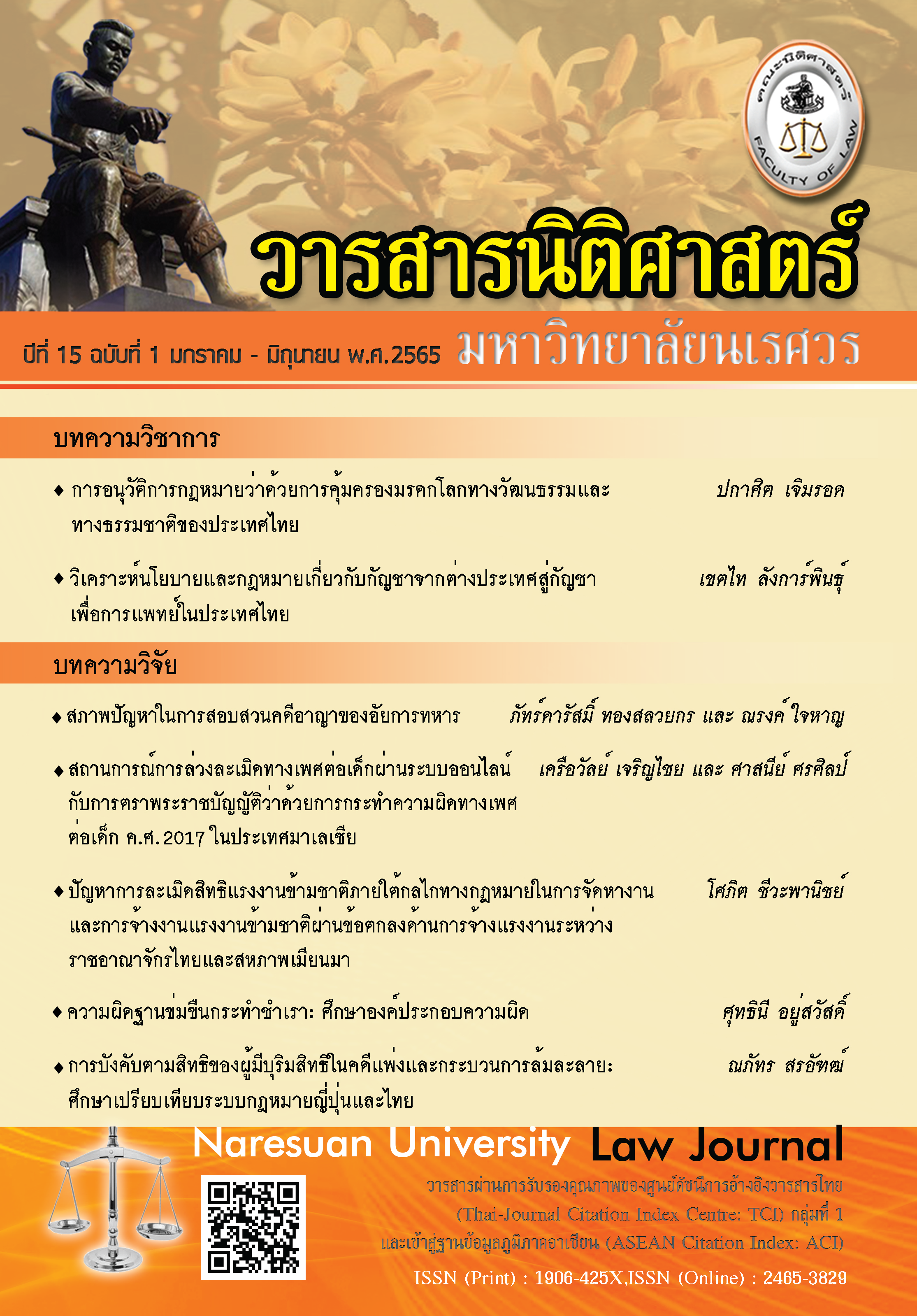Criminal Investigation Problems of Military Prosecutor
Main Article Content
Abstract
The objectives of the article were to study the conditions and problems in the investigative process by the Military Prosecutor and to do a comparison relative to the roles and responsibilities of the Military Prosecutor, the investigation process, as well as the protection of the rights and the freedom of the defendant in the United States of America and the Federal Republic of Germany in order to bring about the application of such process to use here in Thailand. By gathering valid information from official interviews of persons involved with the criminal investigation process in the Military court, directly and indirectly; it’s discovered that major problems in the investigative process by the Military Prosecutor includes (1) the lack of manpower resulting from ineffective selection criteria and insufficient trainings for the personnel, increasing cooperation from competent external agencies has helped by organizing criminal investigations in the form of participating military prosecutors. As for the military prosecution course of the Constitutional Department Criminal investigation courses should also be added. (2) the lack of budget necessary to have a systematic plans as well as efficiency in programs development, solving problems through cooperation of external agencies with knowledge and expertise to help, allowing the Ministry to reduce the budget burden on developing justice missions (3) the lack of necessary technological and Forensic-science tools for use in the process of investigation, the development of skills, materials or technology may be achieved through the cooperation of external agencies with knowledge and expertise to assist in the work. (4) ineffective management of manpower, timeframe, and the lack of proper check-and-balance mechanism by the third party organization, establishment of a specific agency for the execution of “special cases”, which means cases that are not under the supervisor’s decision-making power. The agency may be responsible for investigating the investigation process that the arrest and the investigation is lawful or unlawful if there is enough evidence by working with prosecutors to ensure transparency and fairness to all parties and (5) the lack of working operational and disciplinary guidelines detailing clear steps to be strictly followed by everyone involved in the process of investigation. The fact that the prosecutor is responsible for both investigating and case-filing also brings about the doubts to all parties in terms of the reliability of the Judicial process, should prescribe the basis for the offense in the Military Penal Code and establish standardized investigative procedures in accordance with the 2017 Constitution. By study the Criminal Procedure Code to comply with the results of the investigations that the regulations used to claim to have the same effect as the investigation accordingly the Military Penal Code, is more likely to be more correct in principle. Each of the aforementioned problems can be compared to similar cases in the United States of America and the Federal Republic of Germany whereas the solutions lie in the adjustment of the structure in the process of investigation by the Military Prosecutor.The issues include necessary qualifications and skills for the job as well as proper check and balance within the organization as well as by other related Judicial organizations. Effective adjustment in such areas can ultimately lead to the improvement of the Judicial process by the Military Prosecutor by having the right trainings, formulating the most appropriate criteria for personnel selection and defining clear operational guidelines.
Article Details
References
Chakrapong Viwatvanich. Principle and Theory of Inquiry. 5th ed. Bangkok: Pimaksornprinting, 2013. [In Thai]
Chakrapong Viwatvanich. “Screening of Evidence during Criminal Inquiry.” Master’s thesis, Graduate School, Chulalongkorn University,1997. [In Thai]
Kerper, Hazel B. Introduction to the Criminal Justice System. Eagan, Minnesota: West Publishing, 1972.
Kanung luchai. Law of Criminal Procedure (Vol.1). 11th ed. Bangkok: Winyuchon, 2018. [In Thai]
Legal Execution Department, Ministry of Justice. “Strategic Plan of the Court of Justice B.E. 2560 – 2564.” Accessed December 10, 2020. http://www.led.go.th/integration/pdf/3-2-4.pdf [In Thai]
Rucha Krairerk. Criminal Proceedings in the Military Court: Office of the Attorney General. Bangkok: Nititham, 2017. [In Thai]
Sarunya Seema Criminal Inquiry. Bangkok: The Secretariat of the House of Representatives, 2021.
The Judge Advocate General’s Department. “Practice guideline The Judge Advocate General’s Department.” Accessed December 10, 2020, https://ddcs.mod.go.th/ข้อมล-Banner-มาตรฐานการปฏิบัติงาน-นขต-สป-ป/6-ธน/6-ธน.aspx [In Thai]


